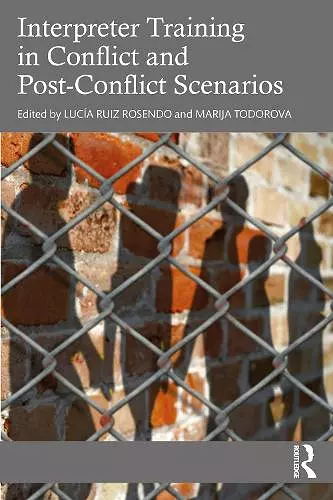Interpreter Training in Conflict and Post-Conflict Scenarios
Marija Todorova editor Lucía Ruiz Rosendo editor
Format:Paperback
Publisher:Taylor & Francis Ltd
Published:29th Nov '22
Currently unavailable, and unfortunately no date known when it will be back
This paperback is available in another edition too:
- Hardback£130.00(9781032136592)

The role of interpreters in conflict situations is of increasing real world importance. There are ethical, cultural, and professional issues that have yet to be explored, and there is a need for specialised training that addresses the specific contexts in which interpreters perform their duties, considering the situated nature of interpreting in these contexts.
This volume is structured around interpreter training in different contexts of conflict and post-conflict, from military operations and international tribunals to asylum-seeking and refugee, humanitarian, and human rights missions. Themes covered include risk management and communication, ethics and professional demeanour, language technology and its use, intercultural mediation, training in specific contexts, such as conflict resolution and negotiation, and working with trauma. Chapters are authored by experts from around the world with a range of different profiles: military personnel, scholars, the staff of international organisations, and representatives from refugee and asylum-seeker-assisting institutions.
Interpreter Training in Conflict and Post-Conflict Scenarios is key reading both for students and scholars researching interpreting in conflict zones and conflict-related scenarios and for practising and trainee interpreters and mediators working for international organisations and the military.
Interpreters with experience of working in numerous conflicts and their aftermaths have repeatedly called for better training to prepare future language intermediaries for these challenging roles. For the first time, this volume draws together perspectives on interpreter training from a wide spectrum of organisations and conflicts into a collection that anyone who trains, recruits or prepares interpreters to operate in conflict and post-conflict settings should read.
Catherine Baker, University of Hull, UK
"the pioneering volume strongly contributes to our understanding of the essential role of interpreters in conflict and post-conflict scenarios, supported by a fascinating collection of revelations from narratives, surveys, interviews, case studies, and interpreter diaries. Recommendations are made to improve institutional recognition, develop adequate professionalisation support, bridge international criminal justice and non-Western languages and cultures, and ultimately the need to standardise institutional training. With its clear merit of multilingual inclusiveness and geographical diversity, this insightful book is thus an invaluable asset for readers interested in conflict resolution, peacebuilding, interpreting studies, and beyond."
Ran Yi, UNSW Sydney, Australia in Interpreter training in conflict and post-conflict scenarios, Peacebuilding, DOI: 10.1080/21647259.2023.2187991
ISBN: 9781032136615
Dimensions: unknown
Weight: 453g
226 pages